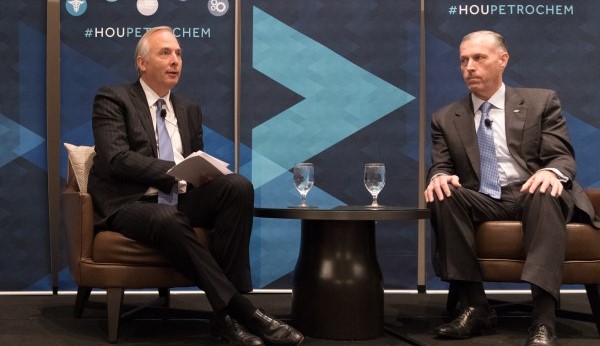6 Takeaways from Dow Chemical’s Jim Fitterling
Published Feb 08, 2019 by A.J. Mistretta

Houston’s identity as the Energy Capital of the World is defined just as much by the region’s downstream capacity for refining fuel and making useful products as it is by oil and gas production. The region accounts for 42% of the nation’s petrochemical manufacturing capacity, making the sector invaluable to the local economy.
In recent years, a petrochemical building boom has triggered huge capital investments on the scale of $220 billion nationwide— and one out of every four of those dollars, or $50 to $60 billion, was invested in Houston.
That type of sector growth prompted the Greater Houston Partnership to launch a new event focused on the petrochemical industry.
Jim Fitterling, CEO of the Dow Chemical Company and COO of DowDuPont’s Materials Science Division was the featured speaker at the inaugural State of Houston’s Petrochemical Industry event. Fitterling participated in a conversation moderated by Bobby Tudor, chairman of Tudor, Pickering, Holt and Co. and the Partnership's 2019 vice chair.
Dow Chemical has approximately 6,300 employees working in a number of facilities across the region. Here are six takeaways from Fitterling’s comments.
China, Brexit on the Minds of World Leaders
Fitterling was in Davos for the World Economic Forum last month where he said the big discussions revolved around geopolitical issues and trade with China. Brexit and its impact on the broader European and global economies was another hot topic. He said there was also a cautiousness around the potential for a global economic slowdown after several years of expansion.
Mid-East Interests Growing
The nations of the Middle East are pushing toward greater industry diversification. No longer content to just be in the business of selling oil and gas, several countries are moving into petrochemicals, and that momentum is building, said Fitterling. There is also a growing drive by Middle East companies to invest in U.S. petrochemical interests.
Feeding the Talent Pipeline a Must
Fitterling believes workforce development must be a focus for petrochemical and other similar industries now facing a labor shortage. Counseling young people to pursue careers in science, math and engineering through targeted programs is critical. “We have to encourage these students because many of them don’t have any idea what they would do in a STEM environment,” he said. At the same time, STEM-related sectors are competing like never before for smart talent against tech companies. “We could double the number of engineering graduates in this country and still not have enough…We need to be doing more.”
Leading on Diversity and Inclusion
In an industry that touches so much of humanity’s day-to-day life, petrochemical companies like Dow must be innovative, Fitterling said. Innovation requires collaboration and strong collaboration requires inclusivity. That’s one reason why Dow has made diversity and inclusion a focus for more than a decade, he said. “Today’s generation looks at companies and they say ‘I don’t want to work there if my friend wouldn’t feel comfortable and accepted there.’…It’s also the right thing to do. So we’ve made this part of the value system of our company.”
Tech and Robotics Not a Threat
Technology advancement has affected not only safety of personnel but also reliability and uptime at plants, Fitterling said. Automation and robotics in manufacturing aren’t going to replace people, but rather change the way employees work, enabling them to focus on higher value work while leaving the lower value tasks to machines. “We need to automate to have workers working on things that matter,” he said. “We are doing ourselves a disservice if we don’t move into the age of technology.”
Creating a Circular Economy for Plastics
Waste management has become a global problem with plastic pollution in the oceans fed by rivers in the developing world reaching staggering levels. But plastics remain one of the most sustainable forms of packaging. Fitterling said the answer is to create a circular economy around plastics that places a value on recycling. “Our society is set up for a linear economy where something gets used once and thrown away,” he said. “If we put a value on it, it will get reused.” Fitterling helped found the Alliance to End Plastic Waste alongside other industry leaders last year. The organization aims to work with the entire sector supply chain along with governments and consumers to put a value on manufactured plastic that keeps it in circulation instead of sending it to landfills. So far more than $1 billion has been committed to the effort with a target of roughly $1.5 billion.
Learn more about other upcoming Partnership events and about Houston's energy industry.
 The Houston Report
The Houston Report


















